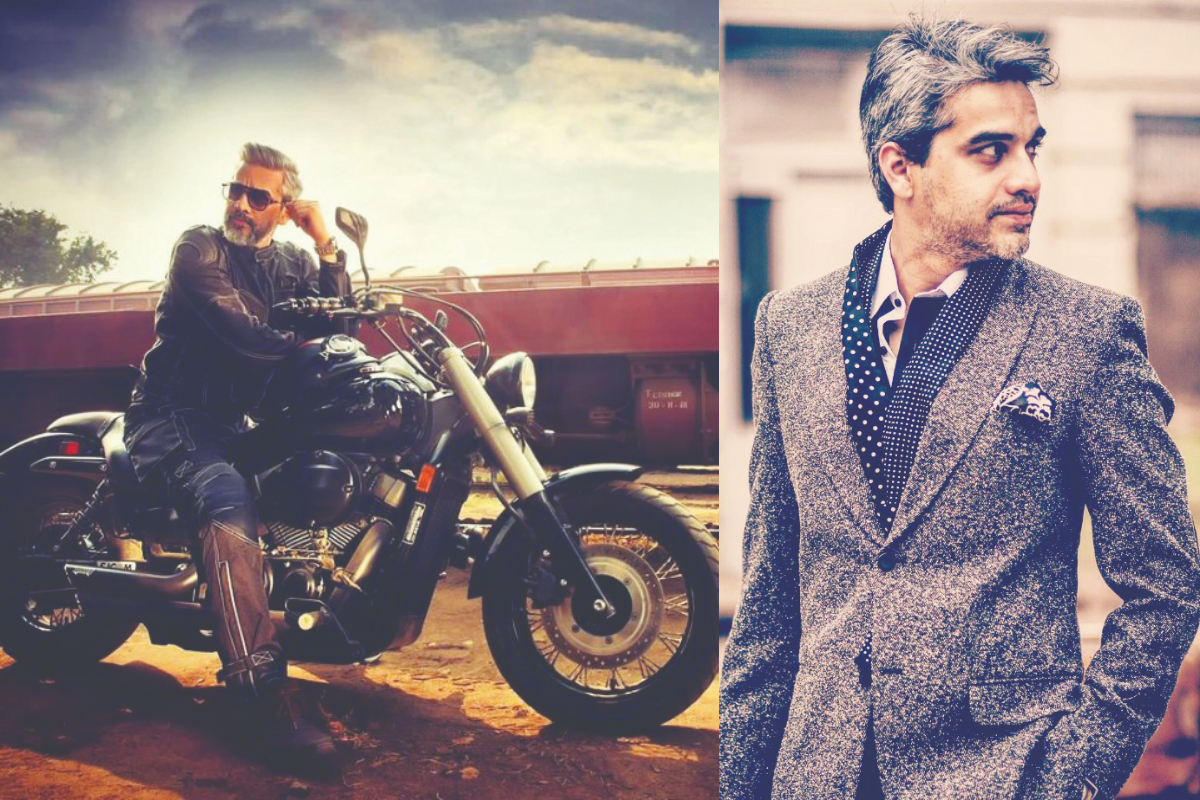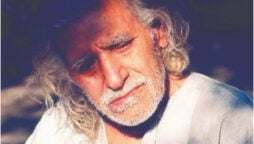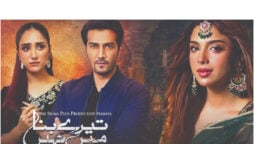
Gaining wider recognition for playing some powerful negative roles, his unconventional acting has made him the most loved villain in the drama industry
An actor, a teacher and a debate coach, Omair Rana has become a household name in the TV industry. He has carved out a reputation for himself as an actor and has many hit TV serials to his credit such as O Rangreza, Sang-e-Marmar, Pyaar Key Sadqay, Dil Na Umeed Toh Nahi and Sang-eMah.
In this exclusive interview with BOLD, Omair Rana talks about his entire showbiz journey that led him to where he is today and spills the beans about some controversies, his career choices and his recent film, Kamli.
When our conversation started, Omair was still doing his wardrobe for the video interviews and he had not yet eaten, but he so kind to offer me his food when it finally arrived. I sensed a bit of a restlessness in him to which he completely agreed, saying he is content yet restless. “I carry my own hulk inside”, we both laughed, “But honestly, I am very fortunate as Kamli has been released and in Pinjra, I got a chance to work with Hadiqa Kiani. I loved my character Mastan in Sang-e-Mah and my character, Zulfi in ‘Dil Na Umeed Toh Nahi’ was a truly gray character and I took it up as a challenge.”
Let’s talk about the first time you encountered the camera as were you feeling anxious or calm at that moment as you usually look from the outside? “I still remember the first time when I got on the screen. It was ‘Teen Bata Teen’ and overacting would work for that sitcom, but I needed to put my theater lessons on the back burner and had to re-learn for different mediums. However, the horrible thing was that I had to build on-screen chemistry immediately and how would I do that? I needed to be casted and many directors, for some reason, won’t cast me. And no one would go through and tell me about such technical points as making eye contact with the camera and the rest. Therefore, I had to learn all of it at work. I would personally not direct or teach an actor on the set, but Nauman Ijaz is among those who would do that and he would provoke me on the sets sometimes. I remember the day when we were shooting for O Rangreza and he was constantly directing me on the set, and I had to do a scene with him. It was irritating me to the extent that when a point came where I was almost exploded, but later I realised that I really needed that provocation which helped me. So, I am grateful.
Sharing his experience about his role in the film ‘Kamli’, he excitedly spoke about his character and the process of observing it for the film. “I think man don’t know the process of self-discovery or they are not emotionally intelligent or maybe they do not give themselves enough time to process things which, as a result, divides them. Malik, my character in Kamli, is a divided person. He belongs to the landed gentry and his values are clear, however, culturally he has a split personality which he needs to assume, raising many questions about him as does he want to compromise what he is seen doing?
As regards the narrative and vision of Sarmad Khoosat about Malik, his character, not deliberately but smoothly, becomes an important part of the story, and that too because of a crazy eccentric wife, Zeenat, the role admirably played by Nimra Bucha.



Both husband and wife seem to struggle with a rather pronounced self-conflict which imparts strength to the plot being in the periphery of the story. Kamli has great music and focuses on moments and the magic that it has is quite matchless.”
“I needed a strong reason to say no to Sarmad when he offered me the role. If we talk about the marketing language, he is a brand by himself and a consistent one. He is honest with his work and his understanding of the art and content is above par. He is a visionary director and I feel lucky to become a part of this project. The script was beautifully written as it was a piece of classic literature which I thoroughly enjoyed.
Omair seemed a bit confused when asked about the characters that he enjoyed the most. He facetiously said that he might be going through an existential crisis as he does not know which character he really enjoyed throughout his career. “I might need some alone moments to think about the number of characters I have played and which one is my favourite. I believe every character has a shade of an actor, however, the human psyche is very complex and it keeps evolving with time.
Talking about his acting prowess, he said he cannot sympathise or empathise with his characters, good or evil. Omair really enjoyed working with such phenomenal actresses as Saba Qamar and Sania Saeed.
Omair has worked with Nimra in ‘Churails’ and it was also his first experience with Saba Qamar in Kamli.
“I have seen the film industry in multiple ways and as a person, who has some knowledge of art, I can firmly say that Pakistan cinema must have its own language and footing. If we ever try to emulate the standards set by the Indian film industry, we will end up doing a bad job.
“We have an added advantage that we have great crew and technicians, best performers and legendary artistes in our own 6,000 years-old soil. Above all, we have great scriptwriters and a wonderful language. We don’t need to follow a particular formula.”
Talking about the drama industry, Omair gave candid and brutally honest answer, “If I were given the freedom as an actor, I would not want my children or family to starve and I would do both theater and film. I don’t mean that I will detach myself from the TV as it has given me immense recognition, love and fame, but I am talking in terms of craft.”
“We, not as performers but as traders, have cracked a formula, replicate it and think small. That is why TV works and cinema doesn’t. We neither think of growing the market nor making collaborations with others. To revive the cinema industry, we all have to collaborate; cinema owners, distributors, producers, exhibitors, and filmmakers and all have to sit on the same table to alter the existing mentality and process that rules.”
“One has to admit the fact the stage belongs to the actor. TV and films, on the other hand, don’t belong to the actors and – are ruled by filmmakers, producers and other people of that category. The stage is a 100% actors medium where ’he can rehearse for days and when the curtains are drawn, there is no chance of retake or rewind, as there is a single take. More so, if someone goes through the etymology of the word ‘rehearse,’ it means to break something down and build again then break it down again. I am saying this with such a purposeful intent because breaking something down that you have built is quite painful. However, the truth is that you cannot build unless you break it and that is what actors must go through. In the end, an actor, showing more of a collaborative and humble attitude, knows the ups and downs of this process and is able to accommodate with both the TV and the film industry.




A theater actor does not mind walking around in bare feet or sitting on the floor. It is all about attitude.
And when one has an entrepreneur’s mindset, one will do both films and plays for theater, and this is how we will have people like Sarmad and Zahid Ahmed while many of them are good-looking too (laughs).
“I am a little tired of the über-left, which is being excessively obsessed with bringing in political correctness, while a human should be more than politically correct all the time. People might have misconstrued things which I had said or done but I have never tried to be politically correct at any stage in my life.
Since almost all actors have now jumped on the advertising bandwagon of clothing brands, salons and whatnot, Omair thinks that this is not his cup of tea. However, he feels anxious when he thinks of royalties and he is up for being caught in controversies knowing the fact that such things may ruin an actor’s career and affect his or her personal life. He says, “These things have a tremendous affect but I have a very thick skin and controversies wouldn’t affect me at all as I don’t pay heed to them. One has to be careful when putting things out in the public. I sometimes think as why to feed those people who are bringing nothing but mayhem in your life. The right thing shown in the wrong manner can really disturb things.”
Omair Rana at his menacing worst

Sang-e-Mah
Written by Mustafa Afridi and directed by Saife Hasan, Omair Rana was at the top of his game in this Shakespeare-inspired tragedy. From his perspective, whatever his character Mastaan Singh did in the story was the right thing, be it killing his master Nasrullah or attempting to kill Atif Aslam’s Hilmand. Add to that his brilliant portrayal as he without trying that hard helped the director hit the bull’s eye. To play Mastaan Singh he completely changed his look and donned a beard, wore a turban, and changed his mannerisms. If he wasn’t that well-known as an actor, many would have thought that the producers got hold of a real-life Sikh for the role.
Omair Rana was at his menacing worst as Sarwar in this Farooq Rind-directed play and brought Zanjabeel Asim Shah’s creation to life in such a way that no one wanted him to have a happy ending in Pyar Ke Sadqay. Had his character just been an abusive step-father to Bilal Abbas’ Abdullah, it would not have mattered but he had the eyes for Yumna Zaidi’s Mahjabeen whom Abdullah married during the course of the play. He used his influence to destroy the lives of everyone around him, be it Mahjabeen’s father, or his own step-daughter played by Srha Asgr, but in the end, his much-older wife played by Atiqa Odho finds out his true intentions, and he ends up in jail.
Omair Rana played narrow-minded Qaiser Khan in Zafar Meraj’s Qurban where he tortured Bilal Abbas’s Jamal by kidnapping his wife played by Iqra Aziz and then making her marry his younger brother Shahmir, played by Shehzad Sheikh. Since the marriage of Shahmir and Heer (Iqra Aziz) was decided when they were young, Qaiser was doing the right thing in his mind, but after shooting Jamal dead on meeting Heer, he crosses the line. In the end, his character had to commit suicide to find the easy way out, and Omair Rana was as convincing as anyone could be even in the final scene.
Catch all the Breaking News Event and Latest News Updates on The BOL News
Download The BOL News App to get the Daily News Update & Live News.














 Read the complete story text.
Read the complete story text. Listen to audio of the story.
Listen to audio of the story.